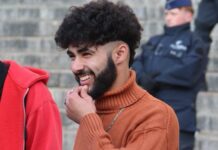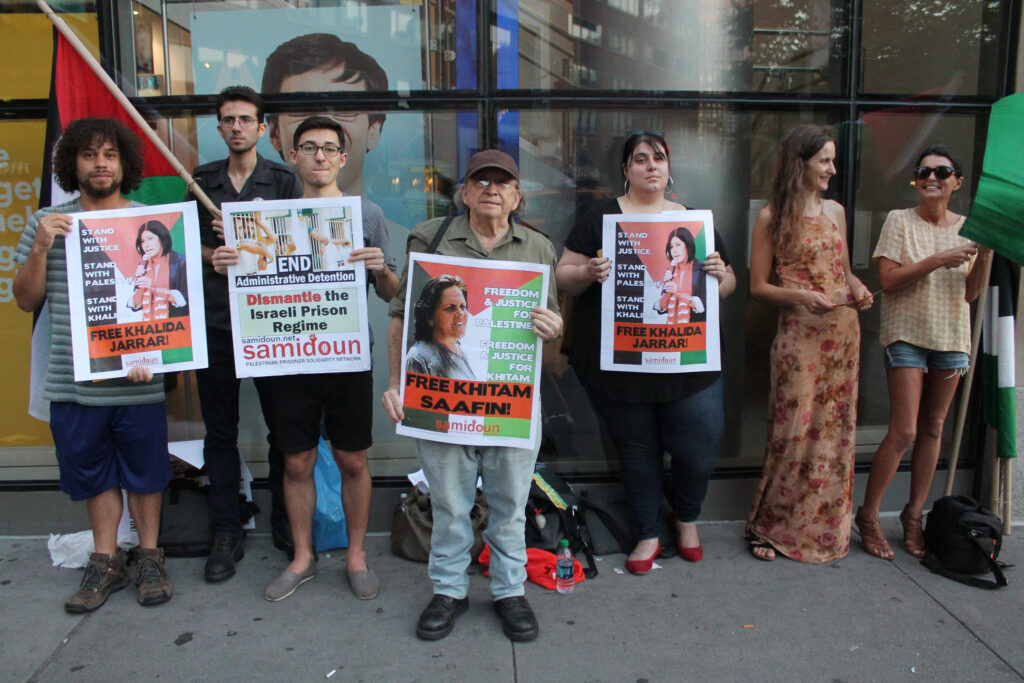
Protesters in New York City gathered outside of the Best Buy electronics store in Union Square to demand freedom for imprisoned Palestinian leaders Khalida Jarrar and Khitam Saafin. Jarrar, a prominent Palestinian national leader and leftist parliamentarian, and Saafin, the president of the Union of Palestinian Women’s Committees, were both seized by Israeli occupation forces in pre-dawn raids on their homes on 2 July. Both are currently imprisoned without charge or trial under administrative detention.
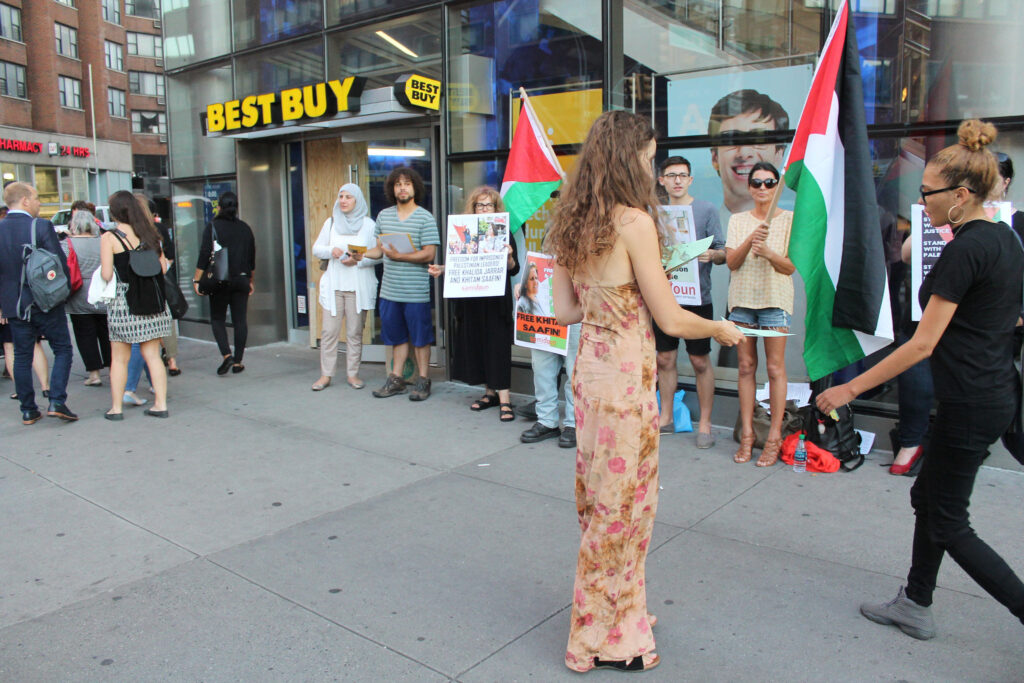
The protest, organized by Samidoun Palestinian Prisoner Solidarity Network, also included distribution of literature about the situation of Palestinian prisoners as well as engagement with Best Buy shoppers about the role of HP in occupied Palestine. Hewlett-Packard consumer products corporations produce printers, laptops, tablets, ink and other consumer computer electronics sold at Best Buy, while its enterprise and other spinoff companies provide IT support, services and technology to the most repressive mechanisms of the Israeli state, including the Israeli occupation armed forces and navy, the checkpoint and ID system that enforces apartheid and suppresses Palestinian life and the Israel Prison Service.
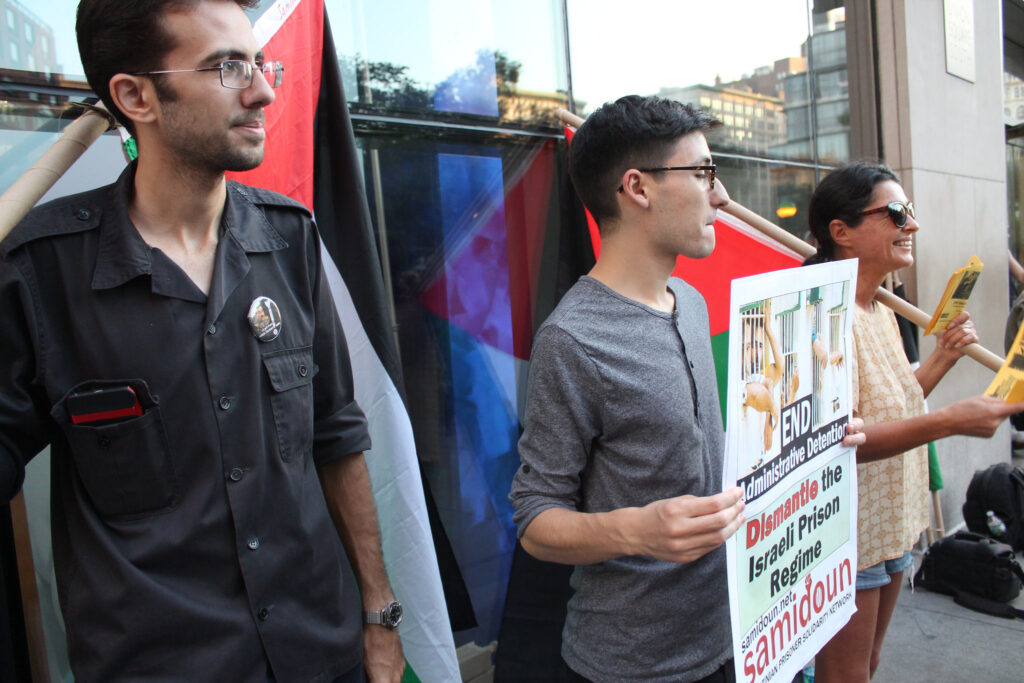
There is a growing movement for global boycott of HP products until the corporation ends its apartheid profiteering and cuts off its contracts with apartheid Israel. A growing number of churches and labor unions internationally are becoming “HP-free zones” in protest of the electronics corporation’s involvement in human rights violations in Palestine.
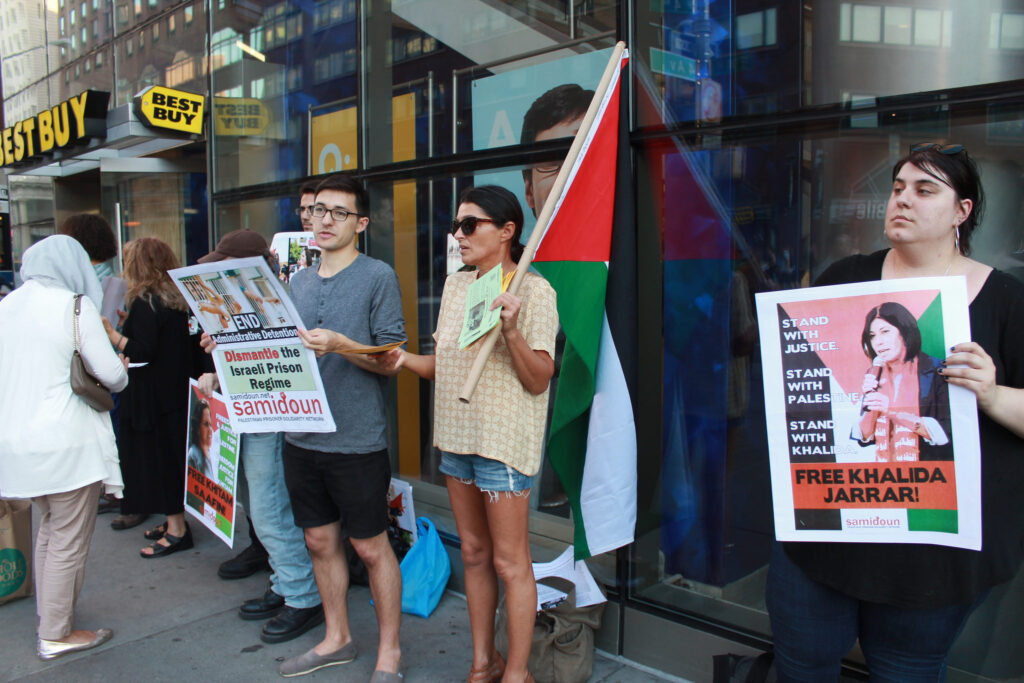
Participants in the demonstration carried Palestinian flags and signs highlighting the cases of Jarrar and Saafin. Jarrar was ordered to six months in administrative detention without charge or trial; she is one of 12 members of the Palestinian Legislative Council currently imprisoned, most held in administrative detention. Khitam Saafin was ordered to three months in administrative detention. The detention order against her expires on 1 October, but as administrative detention orders are indefinitely renewable, there remains a risk until the last possible minute. This demonstration came alongside other international events and actions highlighting Jarrar, Saafin and Palestinian women prisoners this week that also emphasize the international attention to Saafin’s case and demands for her immediate release.
Jarrar and Saafin, as prominent international leaders, have received support from international organizations and and political parties, including the Communist Party of Spain, the Landless Workers’ Movement of Brazil, the Hellenic Union of Progressive Lawyers, a number of European parliamentarians and the government of South Africa.
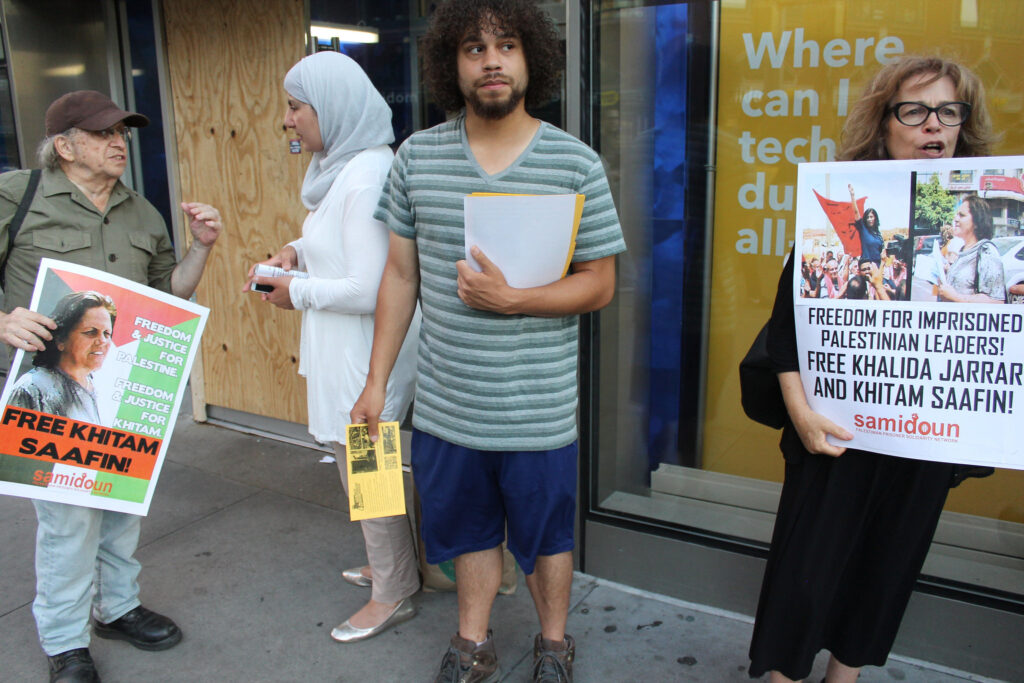
There are over 450 Palestinians imprisoned without charge or trial under administrative detention orders, among over 6,200 Palestinian political prisoners in Israeli jails in total. These orders are issued for one to six month periods and are indefinitely renewable; Palestinians can spend years at a time jailed without charge or trial. Jarrar and Saafin are among 58 women prisoners in Israeli jails; both are held in HaSharon prison, where 10 minor girls are also imprisoned. They are two of five Palestinian women held under administrative detention, alongside Ihsan Dababseh, Sabah Faraoun and Afnan Abu Haniyeh.
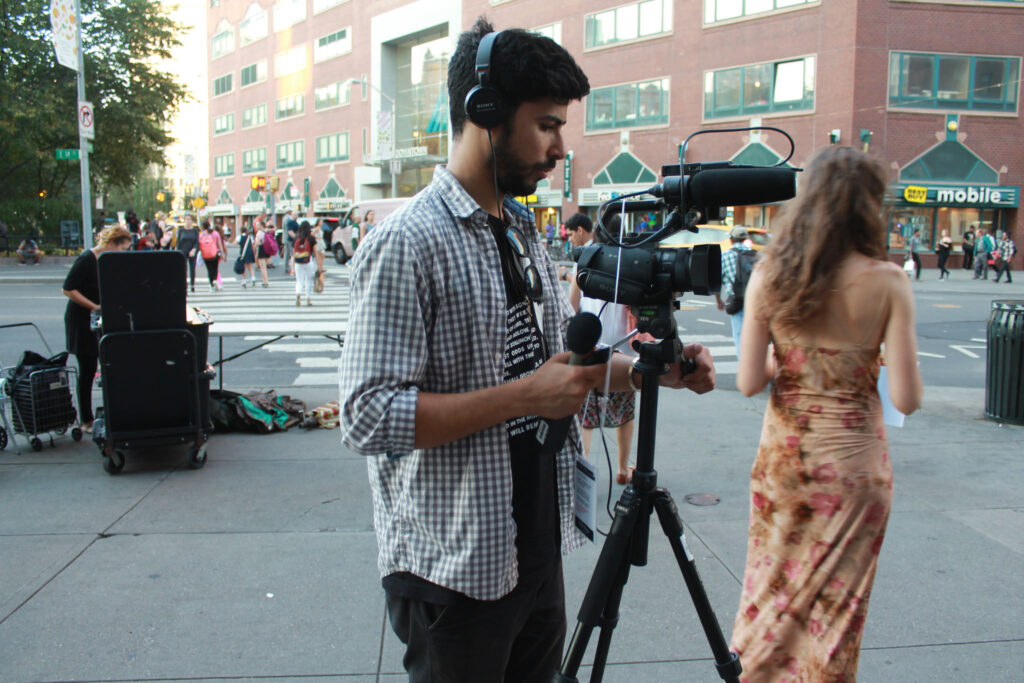
During the protest, a graduate student at New York University stopped at the protest and interviewed participants for a video and essay hosted at his blog. The NYU student, a Palestinian from Gaza, had studied English several years before in a class in Gaza’s University College of Arts and Sciences taught by Joe Catron, Samidoun’s U.S. coordinator and a participant in the protest.
Passers-by were enthusiastic about the protest and a large number of flyers were distributed about Palestinian prisoners and about HP complicity in Israeli apartheid. Many stopped to have further conversation about the issues raised and find out more about the HP boycott.
Following the protest, a number of participants attended an event at NYU on the Balfour Declaration from the Perspective of its Victims, featuring a lecture by Prof. Rashid Khalidi, which focused on the situation of Palestinians for the past 100 years and the role of the British and U.S. empires in imposing Zionist colonial domination on occupied Palestine.
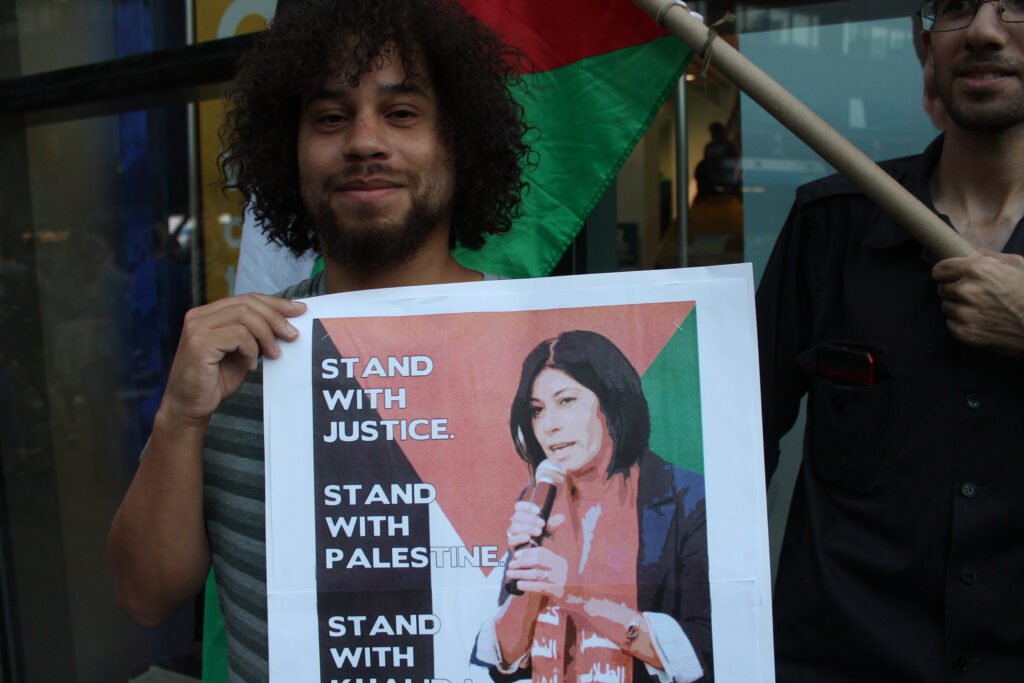
Samidoun activists are also working for international solidarity in multiple contexts. Christian Cobb of the Workers World Party, a weekly participant in Samidoun protests in New York City, will be traveling to Cuba for two weeks to participate in the “In the Footsteps of Che” international brigade. In addition to studying the history and legacy of Che Guevara and the Cuban revolution, including meeting with veterans of the revolution, participants will join direct hurricane relief volunteer actions to support the Cuban people’s rebuilding after the damage caused by Hurricane Irma. Several other New Yorkers, including participants in Palestine actions and Samidoun protests, will also be joining the brigade.
Many Samidoun activists will be joining the upcoming screening of “Kafr Kassem” in New York on 1 October, organized by the Open Committees of Al-Awda NY, the Palestine Right to Return Coalition. The classic 1974 film by Borhane Alaouie has been subtitled into English and will see its U.S. premiere at the Anthology Film Festival. It highlights the story of the massacre at Kafr Kassem with innovative film techniques that center the lives and experiences of Palestinians.
Samidoun will also participate on 30 September in a reception to honor the Rev. Edward Pinkney of Benton Harbor, released in June 2017 after 30 months in prison on trumped-up political charges. The reception is being organized by the International Action Center, New Abolitionist Movement and Free Mumia Coalition.
Discover more from Samidoun: Palestinian Prisoner Solidarity Network
Subscribe to get the latest posts sent to your email.

